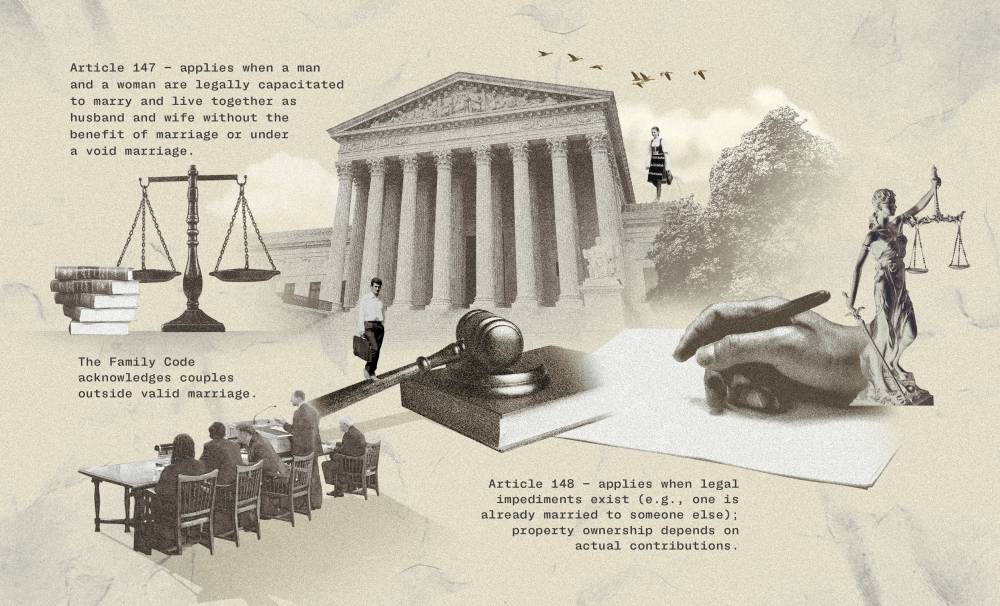Who owns what and who gets what?

While Philippine law clearly lays down the rules on property relations between legally married couples, many still choose, or are forced by circumstance, to live together as husband and wife without the benefit of a valid marriage. Whether it’s due to personal choice, financial difficulties, or legal obstacles, these arrangements often raise important legal questions, especially when it comes to property ownership and rights.
In our country, the Family Code acknowledges such arrangements by regulating the property relations between couples living together outside a valid marriage.
What are the rules on property relations between couples outside a valid marriage?
Chapter 7 of the Family Code of the Philippines (Executive Order No. 209), particularly Articles 147 and 148, sets out the rules governing property acquired by common-law partners.
Article 147 applies to situations where a man and a woman live together as husband and wife without the benefit of a valid marriage, but are legally capacitated to marry. On the other hand, Article 148 covers property relations in cohabiting relationships that do not fall within the scope of Article 147, such as when legal impediments to marriage exist.
Article 147 – When two persons, capacitated to marry, are living with each other as husband and wife without the benefit of marriage or under a void marriage
This provision of law applies if a man and a woman (1) are both capacitated to marry and (2) are living exclusively with each other as husband and wife, without the benefit of marriage or under a void marriage.
Who may be covered under Article 147?
For Article 147 to apply, first, the person must be at least eighteen years old to be capacitated to marry (Article 5 of the Family Code). The marriage must also not be incestuous (Article 37 of the Family Code) or against public policy (Article 38 of the Family Code). It also requires that both couples must not be validly married to someone else.
If a person is considered capacitated to marry under the law, then the next consideration is whether the parties are indeed cohabiting as contemplated under the law. Philippine case law has already provided for what the term “cohabit” means in Ocampo v. People (G.R. No. 47756), which is “to dwell together, in the manner of husband and wife, for some period of time, as distinguished from occasional, transient interviews for unlawful intercourse.”
The law, however, does not specify how long the cohabitation must be (Persons and Family Relations 2025 ed., Melencio Sta. Maria). Therefore, as long as the couple consistently lives together in the manner of husband and wife, even without a definite time requirement, they may be deemed to be cohabiting within the meaning of the law.
What is the legal effect of being capacitated to marry and living together as husband and wife, although not married or in a void marriage?
Under the law, the wages and salaries earned by the cohabiting couple during the time that they are together, shall be owned by them in equal shares. As for property, those which they have acquired through their work or industry shall be governed by the rules on co-ownership.
Generally, properties they’ve acquired while living together shall be presumed to have been obtained by their joint efforts, work or industry, and shall be owned by them in equal shares. However, such presumption is disputable, therefore, this rule does not apply if there is proof showing that the property was acquired only through one party’s efforts.
But even if one party did not directly participate in acquiring a certain property, they are still considered to have contributed equally to acquiring that property if it is shown that they were responsible for taking care of the family and managing the household.
So in the event that the cohabitation ceases and they would like to liquidate their common properties, only the properties acquired while they lived together shall be considered for liquidation (Paterno v. Paterno).
If a property is acquired during cohabitation and owned by both parties, the consent of one is needed for the other to encumber or dispose his or her share in the property. Additionally, the parties are also prevented from donating to each other, since they are also prohibited from donating or waiving any interest in the co-ownership—as this would constitute a gratuitous advantage to the other (Perez v. Perez-seneprida).
This is a similar rule in valid marriages since the law prohibits spouses from donating to each other during the subsistence of the marriage (Article 87 of the Family Code).
In cases where the cohabitation arises from a void marriage, should there be a party in bad faith, then the share of such party in the co-ownership shall be forfeited in favor of their common children. And in case of default or waiver of their common children or descendants, the vacant share shall belong to the respective surviving descendants.
If there is no children, the share shall belong to the innocent party. The forfeiture shall take place upon termination of the cohabitation.
What happens if I am cohabiting, but I am not capacitated to marry, or what if my marriage is against public policy?
The following article provides that if any of the parties are not legally capacitated to marry, only the properties acquired by both of them through their actual joint contribution of money, property, or industry, shall be owned by them in common. This means that the salaries and wages each party earns shall solely belong to such individual or to the conjugal property of such person, as the case may be.
But in cases where it is through their actual joint contribution, such share in the property is only in proportion to what they have contributed. However, if no proof is shown as to how much they actually contributed, it is presumed to be equal. Unlike the previous Article, which presumes property was acquired through joint efforts, this provision requires concrete proof of each party’s actual contribution. Without such evidence, there is no presumption of co-ownership or equal sharing (Villanueva v. CA; Agapay v. Palang).
If one of the cohabiting parties is actually validly married to someone else at the same time, his or her share in the co-ownership shall belong to the conjugal property with the valid spouse.





















